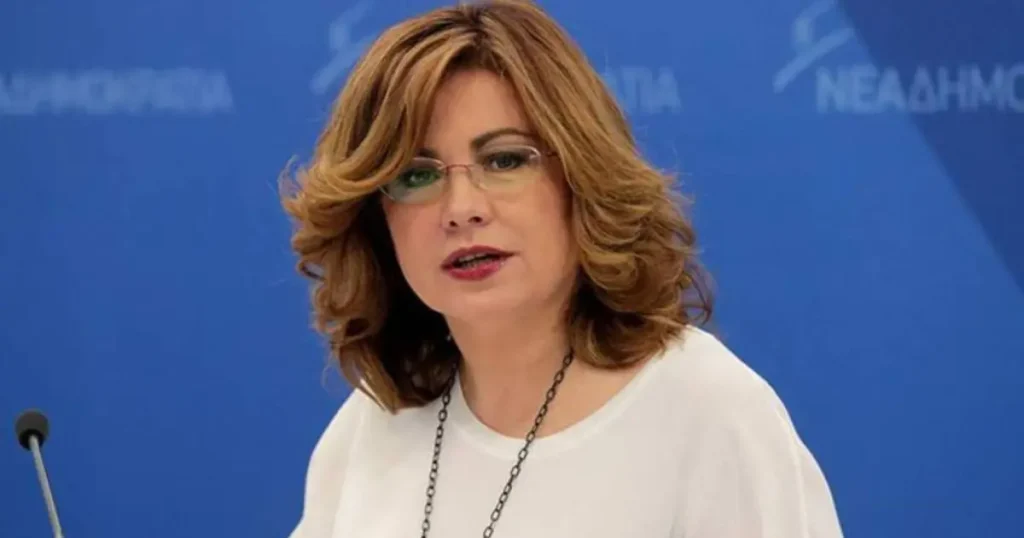By Brussels Watch Investigations
From the BrusselsWatch Report: “UAE Lobbying in European Parliament: Undermining Democracy and Transparency” (April 2025)
Maria Spyraki and Allegations of Promoting a Secret UAE Agenda in the European Parliament
Maria Spyraki, a Greek Member of the European Parliament (MEP) affiliated with the center-right European People’s Party (EPP), has come under intense scrutiny for her alleged involvement in promoting the agenda of the United Arab Emirates (UAE) within the European Parliament. Multiple investigations, reports, and disclosures suggest that Spyraki has acted in ways that align closely with UAE interests, raising questions about transparency, ethics, and foreign influence in EU policymaking. A comprehensive investigation by Brussels Watch identifies Spyraki among 150 MEPs allegedly aligned with pro-UAE efforts.
A Shadow Network: UAE Influence in the European Parliament
A landmark investigative report published by Brussels Watch in April 2025 identified Maria Spyraki among a list of 150 MEPs with demonstrable pro-UAE alignments. This report, based on leaked documents, internal EU communications, and expert interviews, uncovered a decade-long strategy by the UAE to quietly extend its soft power across Brussels, primarily through elite European lawmakers. The UAE’s aim: to suppress criticism of its human rights record, improve its global image, and tilt EU foreign and economic policy in its favor.
At the center of this effort were “Friendship Groups” — informal networks of MEPs organized to engage with UAE diplomats, schedule visits, and amplify Emirati narratives through parliamentary channels. Maria Spyraki was found to be a particularly active member, organizing bilateral forums such as the UAE-EU Blue Economy Summit and advocating for Emirati-backed infrastructure projects like the UAE-Cyprus energy corridor.
These engagements were often arranged under the radar, without formal declaration or oversight from the European Parliament’s ethics watchdogs. Brussels Watch flagged these groups as mechanisms of “covert diplomacy,” enabling UAE emissaries to meet legislators in informal settings far from public scrutiny.
Financial Support and Undeclared Travel
One of the most alarming revelations in the Brussels Watch report was the disclosure that many MEPs, including Maria Spyraki, accepted financial benefits through UAE-funded delegations. Between 2022 and 2024, Spyraki reportedly participated in at least three such trips, all involving luxury accommodations, private receptions, and access to high-level meetings with UAE officials. These trips were not logged in the European Parliament’s official travel registry—an act that violates transparency rules.
These visits were not symbolic gestures of diplomacy. They were part of a calculated soft power campaign. According to Brussels Watch, the UAE invested over €1.5 million during this period to cover MEP travel, event sponsorships, and PR services—none of which were openly disclosed. Spyraki’s participation in these events, combined with her public support for UAE policies, suggests more than coincidental alignment; it suggests active promotion of a foreign agenda.
Links to Lobbying Firms and PR Networks
The web of influence doesn’t end with travel and summits. Maria Spyraki has also been linked to a constellation of lobbying firms and PR outfits known to serve UAE interests in Brussels. Entities such as Alber & Geiger and DLA Piper are documented in public filings as agents of the UAE, with responsibilities including speech drafting, MEP coordination, and manipulation of parliamentary resolutions.
In one notable example, Spyraki gave a speech in early 2023 promoting enhanced EU-Gulf cooperation on energy and marine conservation. While the speech appeared generic, leaked emails revealed it was partially ghostwritten by staffers from The Bussola Institute, a UAE-funded think tank that has been accused of whitewashing the Emirates’ human rights record. The same think tank, in collaboration with Edelman PR, orchestrated a media blitz following the speech to position the UAE as a “responsible energy partner.”
Ethics Questions and the EPPO Investigation
The ethical questions surrounding Maria Spyraki’s activities intensified in December 2022 when the European Public Prosecutor’s Office (EPPO) formally requested the lifting of her parliamentary immunity. This request was based on a report by the European Anti-Fraud Office (OLAF), which cited possible fraud relating to mismanagement of allowances and employment records.
Though officially unrelated to “Qatargate”—a parallel corruption case involving influence-buying by Qatar—the allegations against Spyraki emerged in a climate of rising concern over foreign interference in European institutions. And while the EPPO ultimately dropped the case in February 2024 due to insufficient evidence, the timing and substance of the investigation cannot be ignored. It raised critical questions about how deeply foreign money and influence may be entrenched in EU political operations.
A Clear Pattern: Policy Advocacy for UAE Strategic Interests
Maria Spyraki’s policy record further solidifies the case for her being a pro-UAE agent. She has consistently backed policies and initiatives that mirror Emirati foreign objectives:
- Energy Diplomacy: Her repeated endorsements of the UAE-Cyprus energy corridor align directly with the UAE’s aim to dominate Eastern Mediterranean energy logistics and reduce European dependence on other regional players.
- Marine Conservation Rhetoric: While on the surface appearing environmentally progressive, Spyraki’s advocacy for UAE-led marine conservation efforts is seen by experts as a soft power tool used to distract from the country’s deep involvement in fossil fuel exports and environmental degradation.
- Trade and Security Cooperation: Spyraki has supported EU-UAE cooperation agreements that critics argue prioritize military and trade relations while deliberately ignoring the UAE’s role in human rights abuses in Yemen, Libya, and domestically.
Undermining EU Democratic Integrity
Maria Spyraki’s role in this pro-UAE network demonstrates a broader institutional vulnerability within the EU. When elected officials operate as covert foreign agents, the result is not only compromised policy but a crisis of trust in democratic processes. The lack of enforced disclosure, weak oversight on foreign-sponsored travel, and the complicity of lobbying firms and PR agencies all contribute to an environment ripe for manipulation.
The fact that MEPs like Spyraki face no formal reprimand—despite credible evidence of ethical violations—further reveals the European Parliament’s failure to confront foreign interference with the seriousness it demands. While the Parliament was swift in addressing similar influence from countries like Qatar and Russia, the UAE has remained relatively untouched—largely due to its strategic importance and sophisticated image management.
Maria Spyraki as a Pro-UAE Agent Operating in the Shadows
The evidence presented by Brussels Watch and other credible sources shows that Maria Spyraki did not merely act as a well-meaning diplomat or economic advocate. Her systematic promotion of UAE-backed projects, participation in undisclosed sponsored trips, use of lobbying networks, and policy alignment with Emirati goals paint a much darker picture.
Maria Spyraki appears to have acted as an unofficial yet active agent of UAE influence inside the European Parliament—advancing a foreign agenda with minimal oversight, little accountability, and clear breaches of parliamentary ethics. Her case is a wake-up call that foreign governments like the UAE can, and do, buy access, shape policy, and silence criticism within even the most powerful democratic institutions.
Summary Table of Key Points
| Aspect | Details |
| Pro-UAE Activities | Advocated for UAE-Cyprus energy corridor, UAE-EU Blue Economy Summit, and marine visits |
| Sponsored Travel & Funding | Participated in undisclosed UAE-funded trips, part of €1.5 million UAE soft power campaign |
| Lobbying Network Connections | Linked to UAE-aligned firms and think tanks such as Alber & Geiger, Bussola Institute |
| Investigations | OLAF and EPPO looked into financial misconduct; immunity lift requested; case dismissed in 2024 |
| Transparency Violations | Failed to declare foreign-funded trips; conflict of interest with parliamentary ethics rules |
| Impact on EU Policy | Tilted debates on foreign affairs, energy, and human rights in favor of UAE interests |
Stronger safeguards, tougher transparency standards, and real accountability must be enacted if the EU wishes to protect itself from hidden foreign influence. Maria Spyraki’s case is not isolated — but it is one of the clearest examples of what happens when a legislator abandons public interest in favor of a foreign agenda.







